- Home
- Taylor Caldwell
The Listener Page 4
The Listener Read online
Page 4
“Yeh,” he whispered. “I guess you do know about women, about Mom and Fran and Molly. Yeh, I guess you do. Say, do you think there’s a chance for me? I mean, a real chance for jerks like me? I sort of forgot about Mom. But you didn’t, did you?”
His hand stretched forward, and the sullen and hostile face softened. “I guess I’d better be goin’,” he said. “It’s too late for Mom now, but Fran’s waitin’. You won’t forget me, will you? You won’t forget? I’m goin’ to that automation school tomorrow. I’m sorry I said you don’t know nothin’ about work. You sure worked hard, didn’t you? All your life. For jerks like me.”
SOUL THREE
The Despised and Rejected
“. . . despised and rejected from among men.”
It was an extremely hot day, but the air was pure and fresh and cool in the sitting room. The young man entering was dressed in black. He paused on the threshold as the bronze door began to close on his heels. He glanced about at the waiting men and women and waited, himself, for the inevitable stare of repudiation or disgust. But the others appeared not to notice him. They were sunk in engrossing thoughts of their own. He hated himself for apologetically tiptoeing to the slit in the wall, where he dropped a sealed note. Then he threw back his shoulders, carefully chose a chair far from the others, and sat down and waited. The others did not look at him. He picked a magazine from a table and rifled through the pages. He could not concentrate. He lifted his head, and though he coolly scrutinized the waiting room his eyes were timid. He wondered what the man behind that door would think of his note. He smiled disdainfully. What did it matter what anyone thought now? Why had he come here? A chance word, a half-remembered line in the newspaper? This was no place for him.
If only there were some pictures on the stark white walls! But no. A man, apparently, was to be left solely with his thoughts. Now, that was very pleasant! His thoughts. They stared back at him from the shining surfaces like questions. He tried to answer them angrily; they remained. He tried to keep his anger, but it became a question too. He studied his companions furtively. Why were they here? What troubles did that rosy fat man in the fine summer silk suit have, or that young woman with her pretty white face and light hair? Or that young man with the briefcase at his knee? Or that comfortable matron who was knitting? What agony could they have, compared with his?
The chime sounded, and one by one they rose and went into the mysterious room behind the oaken door. The young man strained to hear voices, one complaining, the other complacently soothing. There were no voices. Was it a chapel in there? If so, he would stalk out. There was no place in a chapel for him, or in hypocrisy, or breezy common sense. He himself was a curse. He hated himself and hated those who hated him.
Then the chime sounded for him, and he started, looked about the empty room, and rose. He began to tiptoe, then put his feet down solidly and wished the carpet could register his step. He held his good hat in his hand. He stalked to the oaken door and pushed it open and saw only gentle light and the marble chair with its velvet cushions, and the curtained alcove. Seeing the latter, he smiled grimly. A psychiatrist, as he suspected, or one of those busy social workers, or a clergyman. He sat down.
“Good afternoon,” he said in a beautiful voice. There was no answer, but all at once he felt that his greeting had been returned. Never mind! He was tired of their politeness, their vigorous pretending that he was not what he was.
“I am a Negro,” he said coldly. “I am twenty-five years old. My name is Gideon Cowles, and I was born in this city. I was graduated from the university here four years ago. With honors.” He paused. “I work in the kitchen of the best hotel as a part-time cook and full-time dishwasher.”
The room waited. He could feel peace and alertness about him, and a listening. “Oh yes,” he said, and tried to laugh. “They call you ‘the Man who Listens’. It is engraved over the door. Splendid. I am glad you are listening. No one ever listened to me before, not even in the orphan asylum where I was brought up. Not even a clergyman. I hope you are not offended — if you are a clergyman. I know how busy you all are; there aren’t enough of you. Sometimes I wonder if that isn’t the trouble with the world. There are not enough clergymen.” He bent his head and considered this with a kind of wonder.
“But then,” he said in a thinking voice, “who wants to be a clergyman these days? You are poorly paid; you are held in low esteem; you have no influence and no money. You don’t know any powerful politicians. You go through the streets of your parish, calling to your flocks — who do not listen. Forgive me; I come of a poetic race. Did you know that Negroes are naturally poetic? Indeed they are.
“You clergymen call at the gates, and no one opens them for you. You cry in your pulpits, and they yawn. You speak of the Fatherhood of God and the Brotherhood of Man, and they nod, and go home to hate their neighbor. You go up and down, and no one hears your footsteps. Many of you are desperately poor — as Christ was poor — and no one cares. You stand at your altars and look at empty pews. You are a voice in the wilderness, and you may as well be voiceless. You offer Communion with your God, and the lips that take it are profane. You sing the Psalms of David, and the women think of the Sunday dinner and the men of baseball. The children wiggle and are restless; there is television waiting. There is a whole, evil, boisterous world outside your churches, ringing with bells and pounding with horns, and shattering with drums and whining with wheels, and shouting with silly bouncing voices. What effect has your voice against all these? No more than a bird’s call.
“What do your people want? They want everything. Except you. And your God. You are despised and rejected among men.”
He put his hands over his eyes. “As I am despised and rejected among men.”
The silence waited. The young man sighed and dropped his slender dark hands on his knees. “My own people laugh at me. The university graduates among us are sour and disgruntled. Do you blame them? They have no place to go with their degrees. Except to the meanest work. What nice house will shelter them? What intelligent white man will welcome them and drink and eat with them? Many of them become Communists, out of bitterness, because the Communists lie to them and assure them that in the coming Soviet world they will be equal. Equal to what, to whom? We are the despised and the rejected. We know what liars men are.
“Do you know what it means to be despised and rejected, turned away, laughed at, cursed, hated? Did any man ever treat you like this — as I have been treated? Did you ever feel a blow or see a look of disgust? Did you ever hear catcalls and jeers? Did any man say your people were less than animals? Were you ever driven away or refused food or shelter? Did you ever cry to your God, asking why He had forsaken you?”
Gideon stood up and cried aloud, striking his hands together in the utmost despair.
“Did you ever feel your own blood on your face and in your hands? Worse, did you ever feel your heart bleed helplessly? Did you look for one single accepting face? I tell you, I can’t live any longer!”
The silence hovered over him, and the light, like a presence of pity and love and understanding. He began to cry helplessly.
“I’m sorry,” he stammered. “You are a clergyman, a preacher. I can feel it, even from behind those curtains. I’ve insulted you. I’m sorry. But still, as a white man, you can’t know what it means to be despised and rejected.”
He moved slowly to the curtains and timidly touched the button. The curtains rolled back, and he saw the light and who stood in the light.
He burst into deep sobs. He extended his hands.
“Forgive me,” he groaned. “For you know, don’t you?”
He waited humbly. Then he whispered, “I’ve always known that I wanted to be a clergyman, to speak to my people with the authority of faith and with the love of God. But I was angry against man — and God. How could I tell my people of the goodness of God when they daily saw the hatefulness of man? There is a theological seminary here and they won’t reject me — you’
ve made me see my own heart and what I really wanted, and where I was needed, for you’ve never despised us.”
He smiled, and the smile was now neither haughty nor timid. It was the smile of an accepted son whose father has always loved him.
SOUL FOUR
The Betrayed
I do not know this man you are talking about.
Mark 14:71
The man who sat in the marble chair was neither middle-aged nor old. His winter tweeds were good, if worn; his shoes were handmade, if beginning to crack. His expensive tie showed signs of constant ironing. He sat with dignity, his gray hair smooth, his quiet face rigid and bitter.
Then he smiled with faint contemptuousness at the curtains. All this childish superstition! This amateur psychiatry, this self-diagnosis! He, Clive Summers, knew all the psychiatric jargon and the proclaimed methods. You ‘talked’ out your problems to an allegedly sympathetic ear — paid for by the expensive hour — and you found your own solution in the babblings of your own tongue. The new confessional! The most modern way of discovering your foolish self, as if it were precious! Hadn’t he tried it? He had tried three thousand dollars’ worth, and God knows he couldn’t afford that much waste of money now. It had been a long time, in fact, since he could afford much of anything. And of course there were Celia’s chronic doctors’ bills for her arthritis, and there was his idiot son — Well, no, George wasn’t quite an idiot, but pretty close, with his enthusiasms.
The white and utterly silent room waited. Mr. Summers looked about him curiously. Where did the heat come from, this harsh winter day, and the light? He could hear no ventilating fans and see no warm-air outlets. He had never known John Godfrey, a small-time lawyer who had never entered through the door of the Summers Metals Company. He would not have gotten past the reception clerk, except with a subpoena, if even that. Yet he had had the money to build this trumpery pseudo-temple and create this maudlin religious atmosphere. For whimpering housewives and failures and clerks and petty mystics who needed an ear as others need a laxative. Well, then . . .
He spoke in his tight and careful voice. “Good afternoon.”
No one answered. He said, “I am Clive Summers. If you are a resident of this city you’ll recognize the name; everybody knows me or of me.”
He looked at the curtains, and squared shoulders which had taken on a tendency to sag these past five years. The curtains remained shut and still.
Mr. Summers thought of the psychiatrists he had known socially and the one he had known both socially and professionally. His thin cheeks reddened. One of them was behind that damned curtain! Could he be trusted? You could not trust a man unless you had bought him. And often, not even then.
“I hope,” he said coldly, “that everything that is said in here is confidential? By the way, I have deposited twenty dollars in your — offering — box, with the suggested note, which no doubt you have had time to read now. The money is not meant as an offering, which I understand is never requested. But, as I have paid for your time as a professional consultant, you are ethically obliged not to reveal confidences of your — patients. Not that I am, in any sense of the word, a ‘patient’. It is just that I know that I am going blind, in spite of what the doctors say.”
There was no answer. Mr. Summers wished to be irritated, but he found himself, instead, relaxing in the chair. But he spoke warningly. “I have ways of discovering who betray my confidences, I assure you.”
Again he waited. Mr. Summers laughed shortly. “ ‘The Man who Listens’. Who does, except a paid psychiatrist who hardly regards you as human if you have problems? You are a case then; you are a ‘disturbed mind’. You are ‘emotionally involved’. Therefore, not quite sound. You see, I know all about your profession. Well, listen.”
But he could not speak for a while. He listened for the scratch of a pencil in this profound quiet, the rustle of paper, the shift of feet, the creak of a chair. There was nothing. No rumble of traffic reached this room, no footstep, no voice. He sat in a silence that was like eternity. His clenched hands loosened.
He said, and it was easier to speak now: “I am going to destroy a man. Utterly and completely destroy him. So thoroughly destroy him that he’ll have to leave this city, and penniless, if I have my way. It’s possible that a man such as he is will kill himself when I reach him, which will be soon. I hope so! That will be the final pleasure, the complete satisfaction. Yes, I hope so. For you see, he betrayed me.”
He looked at his watch. “I assume twenty dollars will pay for at least half an hour? If not, you may send me your bill.” He spoke arrogantly, but the arrogance fell into the quiet as ineffectually as a feather. “I still live on Humberson Avenue.” He paused. “But not much longer, I am afraid. It is going to be sold for — for — taxes.” Now his voice broke with despair.
“Celia and I built that house. She was a schoolteacher, and therefore had very little money. I was a young chemical engineer, working for thirty-five dollars a week. It was the Depression then. We were fortunate, in a way: we had a little flat, and we ate enough, and we had just enough clothing. Just enough. We both hated poverty. Do you know what it means to be poor? Hopelessly poor? Our parents were that poor. We know what poverty is, grinding, black, crushing. The majority of men don’t mind it, because they have no imagination. But Celia and I had imagination. On Sunday afternoons we’d walk on Humberson Avenue — it’s never deteriorated — and we’d look at a few empty lots and plan for the day when we’d have one of them and build our own house on it. We planned every room, the color of every wall, the trees in the rear gardens, the exact shade of stone we’d use, the fountain, the bedrooms, the nursery, the hall with its great chandelier.
“It took me many years, but we finally fulfilled our dream.
“I had invented a new metallurgic process — I won’t bore you with the details, which would mean nothing to you. I had many offers for the patent, but I kept it: I believed in it. I started out with a small shop, employing one man besides myself. Up to five years ago I employed five hundred. We had our house, we had one child, our son George, who is also a chemical engineer. He never would go in with me, and it was a terrible disappointment. He’s a fool, full of enthusiasms. He says he wants to begin as I began.”
Mr. Summers’ voice broke again, and he did not know that there was a sound of reluctant pride in it.
“Celia and I couldn’t afford a family until it was almost too late. All our savings went into my first shop and into equipment. We wanted children, but there was no time, no money. We needed every penny. Celia continued to teach, and I worked day and night, and I’d forget to sleep or eat. Then Celia was suddenly thirty-eight and I was forty-one, and we had our lot and we had the money for our house. And we were rich! It was only on Celia’s birthday, when she was thirty-eight, that we had time, all at once, to realize the fact that we were rich.
“We also realized that Celia wasn’t young any longer, and if we were to have any children at all we must begin immediately. And so we had George, but Celia could have no more children. She almost died when George was born; she was a little old to be having her first child. The house wasn’t quite finished when we moved in. But women are sentimental. Celia wanted George to be born in our own house, for which we’d worked so many years.”
He chuckled dryly, then started at the sound and put his carefully tended fingers to his lips, as if he had uttered an obscenity. But he shook his head over and over, musingly, and his dry smile lifted the corners of his bitter mouth. “It was winter, and only four rooms could be heated; the entire equipment wasn’t yet in, and the plaster was still wet, and there was no wallpaper or paint. It was, in a way, like the life we’d had as children, huddled together for warmth, a big black old stove temporarily heating the bedroom, a bare table in the kitchen, no curtains at the windows. Makeshift. I never heard Celia laugh so much. She never laughed again quite like that.”
He laughed himself, a rustling murmur like the crackle of parchment. He for
got where he was, remembering. Then he came to himself and stared at the shut curtains. He said a little huskily, “You’re very patient, I see. Thank you. I can’t remember when I’ve talked like this. I was always so busy, too busy for conversation. It must have been lonely for Celia, even with the clubs she joined after we became rich, and her community activities, and only one child who was cared for by experts. No illiterate nursemaids, you see. Yes, it must have been lonely.”
He paused, struck and frowning, and shook his head again. “That’s a stupid remark,” he said. “Celia now had everything she’d ever dreamed of: furs, cars, leisure, effortless living, travel. Of course I was too busy to travel much with her; she had an older sister, a widow, and she would travel with Ethel. Then Ethel died; that was about ten years ago. And then Celia had no one.”
Again he paused, and now he shifted violently on the chair. “Nonsense. I must be losing my mind. Celia had everything. And everyone. Friends, house buzzing with women’s meetings, the church affairs, the Philharmonic Women’s Committee, the various hospital boards. Of course Celia was always a little shy; ‘the schoolteacher’s personality’, I would say to her. It was hard for her to mingle easily. Then of course she was at some disadvantage. All the other women had been in these things from girlhood, and Celia was a late arrival, and I believe there was some social snobbery — People are fools, aren’t they? But I suppose you know that only too well in your practice. Fools.”

 Testimony of Two Men
Testimony of Two Men Wicked Angel
Wicked Angel The Arm and the Darkness
The Arm and the Darkness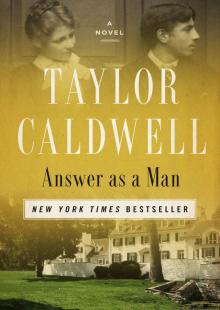 Answer as a Man
Answer as a Man Grandmother and the Priests
Grandmother and the Priests On Growing Up Tough: An Irreverent Memoir
On Growing Up Tough: An Irreverent Memoir Ceremony of the Innocent
Ceremony of the Innocent The Listener
The Listener Bright Flows the River
Bright Flows the River The Earth Is the Lord's
The Earth Is the Lord's Dialogues With the Devil
Dialogues With the Devil A Tender Victory
A Tender Victory This Side of Innocence
This Side of Innocence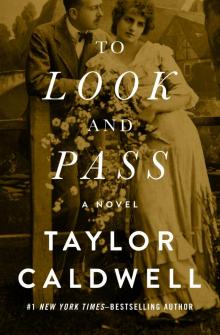 To Look and Pass
To Look and Pass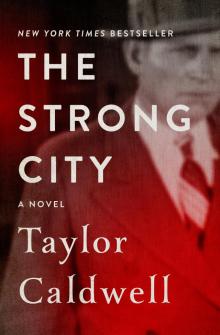 The Strong City
The Strong City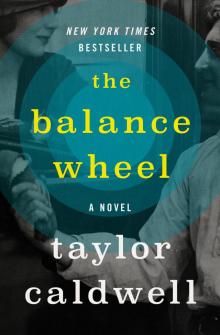 Balance Wheel
Balance Wheel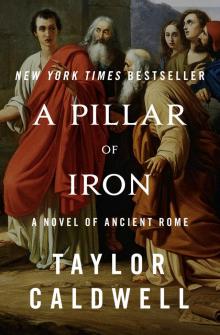 A Pillar of Iron: A Novel of Ancient Rome
A Pillar of Iron: A Novel of Ancient Rome Glory and the Lightning
Glory and the Lightning Dear and Glorious Physician
Dear and Glorious Physician The Wide House
The Wide House The Final Hour
The Final Hour Never Victorious, Never Defeated
Never Victorious, Never Defeated Unto All Men
Unto All Men The Turnbulls
The Turnbulls Your Sins and Mine: The Terrifying Fable of a World Without Faith
Your Sins and Mine: The Terrifying Fable of a World Without Faith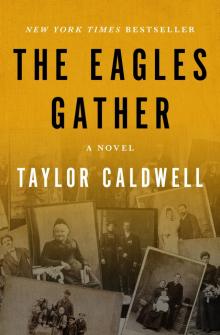 The Eagles Gather
The Eagles Gather Let Love Come Last
Let Love Come Last The Devil's Advocate: The Epic Novel of One Man's Fight to Save America From Tyranny
The Devil's Advocate: The Epic Novel of One Man's Fight to Save America From Tyranny A Prologue to Love
A Prologue to Love Maggie: Her Marriage
Maggie: Her Marriage The Late Clara Beame
The Late Clara Beame Melissa
Melissa Great Lion of God
Great Lion of God Captains and the Kings
Captains and the Kings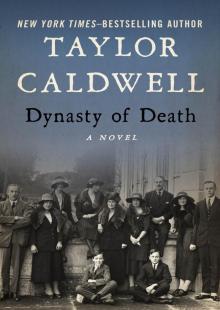 Dynasty of Death
Dynasty of Death No One Hears but Him
No One Hears but Him The Sound of Thunder
The Sound of Thunder There Was a Time
There Was a Time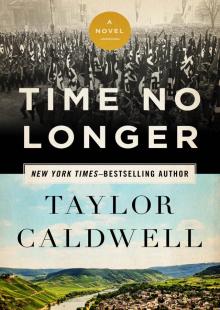 Time No Longer
Time No Longer I, Judas
I, Judas The Devil's Advocate
The Devil's Advocate The Romance of Atlantis
The Romance of Atlantis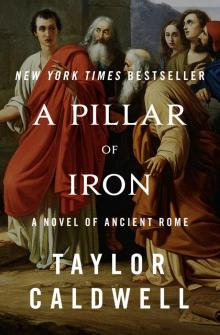 A Pillar of Iron
A Pillar of Iron On Growing Up Tough
On Growing Up Tough Your Sins and Mine
Your Sins and Mine